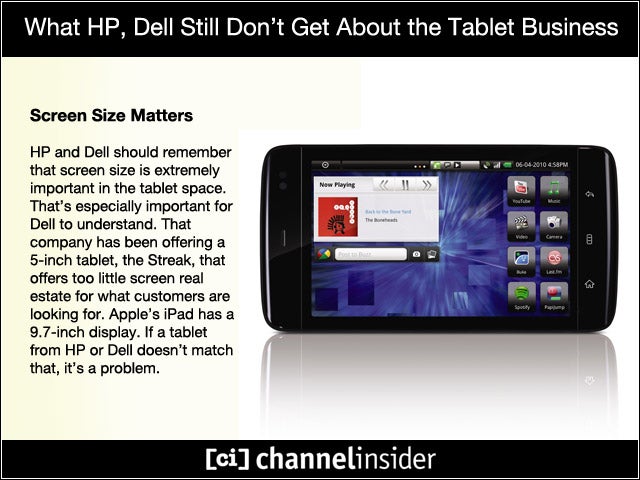 Screen Size Matters
Screen Size Matters
HP and Dell should remember that screen size is extremely important in the tablet space. That’s especially important for Dell to understand. That company has been offering a 5-inch tablet, the Streak, that offers too little screen real estate for what customers are looking for. Apple’s iPad has a 9.7-inch display. If a tablet from HP or Dell doesn’t match that, it’s a problem.
 Don’t Go With Windows
Don’t Go With Windows
Windows works extremely well as a platform on laptops and desktops, but it won’t appeal to consumers or enterprise customers looking for productivity with a tablet. Windows doesn’t work all that well on tablets, since it’s still designed with a mouse and keyboard in mind. But mobile operating systems do. And they should play a role in tablets from Dell or HP going forward.
 Current Android Versions Won’t Work
Current Android Versions Won’t Work
Just as Windows won’t work, it’s important that HP and Dell realize that Android 2.2 won’t be the ideal option either. Google itself said that Android 2.2 isn’t designed for tablets, and most vendors would be smart to wait until the next version of the operating system is released before offering such a device. Android 2.2 is fine for smartphones, but for tablets, it doesn’t work. And it’s time HP and Dell realize that.
 The PC Model Is Long Gone
The PC Model Is Long Gone
The PC model works exceptionally well when it comes to laptops and desktops. HP and Dell simply mass-produce products with simple designs to limit costs, install Windows, and make them available. But that doesn’t necessarily work with tablets. Right now, the tablet with the most features that work well will take the day. Trying to be the most cost-effective option or the power user’s choice isn’t necessarily best. Tablets are about consumers and ensuring they’re happy.
 These Are Different Tablets
These Are Different Tablets
Both HP and Dell have a long history with tablets. The companies offered old-style tablets running Windows that were controlled by a stylus. They weren’t successful, and for the vast majority of customers, they didn’t seem like a viable option. The last thing HP and Dell should do is follow a similar strategy with this new lineup of tablets. The past most certainly shouldn’t provide strategy plans in the future.
 The Keyboard Is Extremely Important
The Keyboard Is Extremely Important
The virtual keyboard’s importance should not be underestimated by HP or Dell. Apple has proven, that the device with the best virtual keyboard will win. But when it comes to virtual keyboards, Apple seems to be the only company that has gotten it right. If HP and Dell aren’t happy with the virtual keyboard available, they should consider another option, including the possibility of a physical keyboard. Tablets that don’t feature accurate typing will fail.
 It’s A Hype Game
It’s A Hype Game
Apple has proven time and again that the smart move in the tablet market is to build hype in every way possible. Admittedly, HP and Dell doing so will be far more difficult than Apple achieving hype. But that doesn’t mean the companies shouldn’t try. Building up hype is important to the success or failure of a tablet. Just ask Steve Jobs.
 It’s Wrong to Follow Apple’s Lead
It’s Wrong to Follow Apple’s Lead
As important as it might be to improve the hype surrounding a tablet, HP and Dell should realize that they can’t simply follow Apple’s lead in the tablet space. Apple has taken a huge lead, and the chances of any company catching it by mimicking what it has done are slim, to say the least. HP and Dell must be innovators that make Apple want to catch up. It’s as simple as that.
 Design Matters
Design Matters
The best way for HP and Dell to take a lead over Apple is to come up with some new design ideas. Currently, the companies’ products aren’t breaking the mold on design. In fact, they look awfully similar to the iPad’s design. That’s not a good thing. Dell and HP should realize that tablets will appeal to consumers first. And those consumers expect a nice design.
 Price Leadership Won’t Work
Price Leadership Won’t Work
In the PC business, taking the lead on price means the difference between success and failure. But in the tablet market, that’s not necessarily the case. The tablet market requires companies to invest heavily in their products to make them as appealing as possible. Price leadership means nothing in the tablet space. And it’s time Dell and HP realize that.

